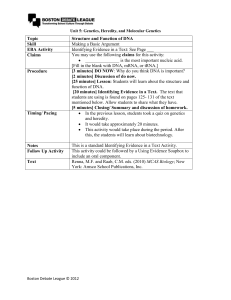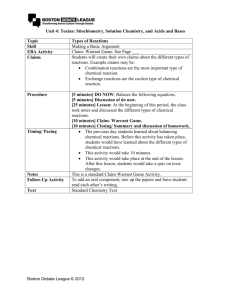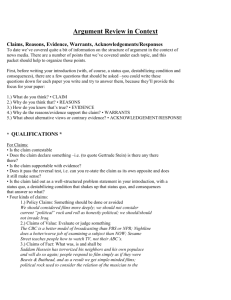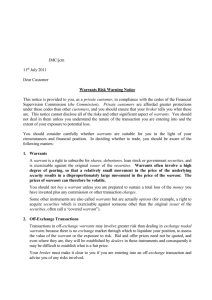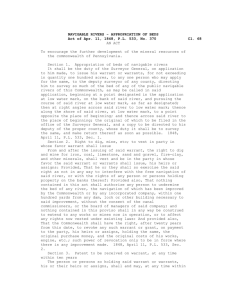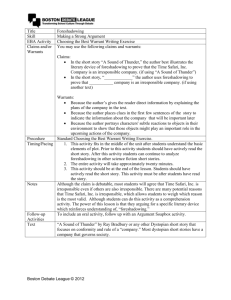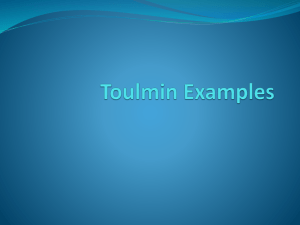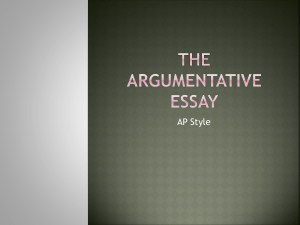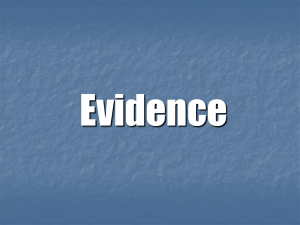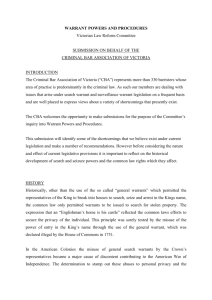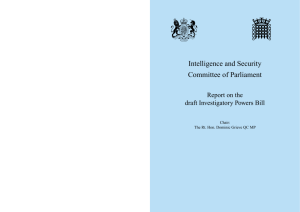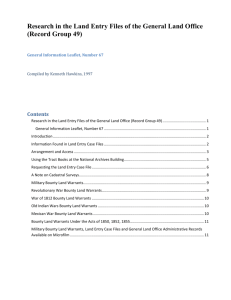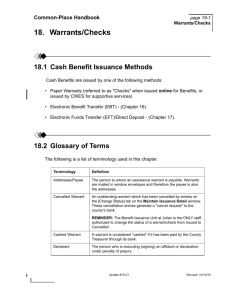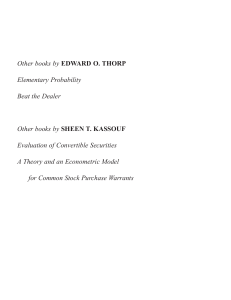Claims and Evidence
advertisement
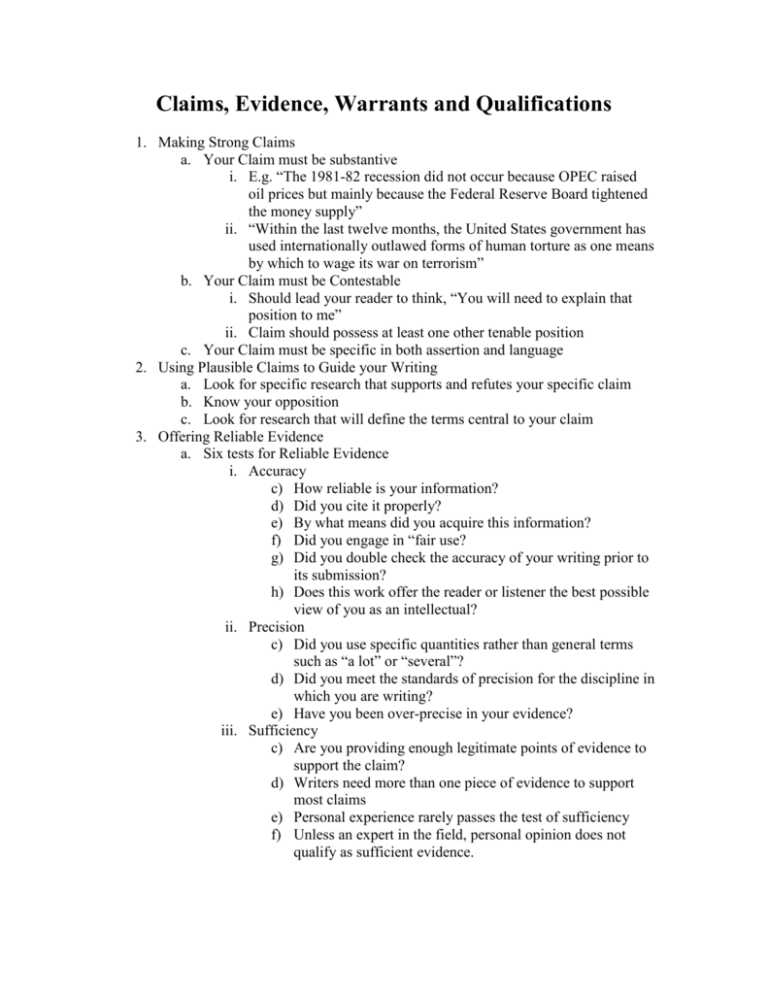
Claims, Evidence, Warrants and Qualifications 1. Making Strong Claims a. Your Claim must be substantive i. E.g. “The 1981-82 recession did not occur because OPEC raised oil prices but mainly because the Federal Reserve Board tightened the money supply” ii. “Within the last twelve months, the United States government has used internationally outlawed forms of human torture as one means by which to wage its war on terrorism” b. Your Claim must be Contestable i. Should lead your reader to think, “You will need to explain that position to me” ii. Claim should possess at least one other tenable position c. Your Claim must be specific in both assertion and language 2. Using Plausible Claims to Guide your Writing a. Look for specific research that supports and refutes your specific claim b. Know your opposition c. Look for research that will define the terms central to your claim 3. Offering Reliable Evidence a. Six tests for Reliable Evidence i. Accuracy c) How reliable is your information? d) Did you cite it properly? e) By what means did you acquire this information? f) Did you engage in “fair use? g) Did you double check the accuracy of your writing prior to its submission? h) Does this work offer the reader or listener the best possible view of you as an intellectual? ii. Precision c) Did you use specific quantities rather than general terms such as “a lot” or “several”? d) Did you meet the standards of precision for the discipline in which you are writing? e) Have you been over-precise in your evidence? iii. Sufficiency c) Are you providing enough legitimate points of evidence to support the claim? d) Writers need more than one piece of evidence to support most claims e) Personal experience rarely passes the test of sufficiency f) Unless an expert in the field, personal opinion does not qualify as sufficient evidence. g) If attempting to disprove a claim using the terms “none”, “never” or “always”, one piece of admissible evidence will demonstrate sufficiency. iv. Representative c) Does the evidence reflect the variety of persons or areas affected by the claim? d) To what degree does your evidence apply to most situations rather than special or unique cases? v. Authoritative c) Who in the world is the author of your evidence? d) Who published the evidence? What do you know of the publisher? e) How recent is the evidence cited? “Hot” or more recent evidence usually stronger. f) Authoritative secondary sources usually targeted to specific rather than general audiences. g) Does the source over-simplify the issues at hand or avoid all technical language? Perhaps time to find another source. h) Remember: just because something may seem to you to be “common sense” it may still not be true or authoritative. i) Do not quote somebody whom all persons in a given discipline scorn or have never heard of. j) Do not quote “Scripture” as authority unless all readers possess your specific religious convictions regarding its divine authority. In most disciplines, use of text in this manner would be inadmissible. k) Authorities must be recognized as such by established communities of experts. Just because you perceive the person as good hearted, impressive or intimidating does not mean their opinions will meet the standard of authority for evidence in a documented essay or public speech. vi. Perspicuous or demonstrates keen mental perception c) Your readers need to see your evidence as evidence d) Out of context direct citation does not serve as evidence e) Statistics—only by its existence in your work—does not serve as evidence. f) Quotations need to be contextualized and interpreted to serve as evidence. g) Tell your reader in specific terms how your evidence is significant in the support of your claim. 4. Warrants a. Serve as the reason why readers should connect your claim to your presented evidence b. Warrants offer the principle or underlying assumption that readers must accept for these connections to be made c. In other words, a warrant is a general principle that serves as a logical bridge between the claim and evidence d. E.g. i. Claim: “The Forest Service has wasted money on fire prevention.” ii. Evidence: “Since 1990, the Forest Service has increased its expenditure on fire prevention on the average of 14% each year, yet the number of Class Three fires has remained the same.” iii. Warrant: Whenever anyone spends money to prevent something but its incidence remains the same, that person or agency has wasted money iv. But a critical question: is this warrant true under most conditions? Maybe not. v. Warrants must be tested for logic and conditionality e. Criteria for Establishing a Warrant i. One part of the warrant must describe the general kind of evidence you offer ii. The other part of the warrant must describe the general kind of claim the naturally follows from the evidence iii. It must state a logical connection between the general evidence and general claim c) Cause and effect d) One signifies the other e) Many occurrences allows for a generalization iv. When writing to audiences that share your assumptions, you rarely need to make warrants so explicit v. In public discourse (and Senior Theses), however, warrants must be explicit vi. Beware of the following types of warrants c) False warrant a. Cause and effect conditions simply wrong b. The general cause does not logical signify the other (or visa versa) c. Even ten thousand occurrences would not allow such an illogical generalization d) Unclear a. Cause and effect poor stated, implicit, or not stated at all b. The general cause is too general or it is not clear on the limits of significance (or visa versa) c. How does your identified occurrence differ from other occurrences? e) Inappropriate a. Cause and effect suggests immoral, unethical or social indefensible positions b. The general cause offers a vulgar, immoral or dishonest representation of the effect c. Even one gazillion occurrences could never warrant such a generalization f) Inapplicable warrant a. Illogical b. Illogical c. Illogical 5. Qualifications a. All positions taken must accept limited uncertainty b. Your claim cannot be applicable to all situations, all persons, throughout all times in history c. As a result, your argument gains strength when you articulate the limits or scope of its reach d. Four forms of Qualification i. Rebuttal of mistaken or illogical objections to your evidence or warrants c) Anticipate the possible objections to your evidence, claim and warrant by conducting proper research d) Demonstrate that you have entertain other claims or evidence but dismissed them for just cause e) Anticipate objections that you know your particular readers might bring with them f) Anticipate the alternatives that your readers might offer g) Define all key terms with precision and accuracy h) Do not oversimplify causes and effects i) Consider counterexamples when presenting evidence and dismiss them for just cause ii. Concession of objection you cannot logically rebut c) Recognize those specific objections that you cannot answer d) You should, however, that the balance of your work more than compensates for this qualification e) Know the other possible positions and concede their logic. Failure to mentions these positions might lead your reader or listener to believe either A) you conducted poor research or B) you are intentionally withholding valuable counterevidence to mislead your audience f) Do not be afraid to suggest that “the problem warrants more study” iii. Stipulation of conditions that must qualify your evidence or limit the application of the warrant c) Conditions rarely stay the same forever d) Admit the possible, specific ways in which shifts in condition might alter the claim, evidence or warrant of your argument iv. Articulate the degree of certainty of your evidence, warrant or claim (it will be rare that you will be absolutely certain about all of these elements) c) Practice humility d) Deny omniscience e) Only state the important moments of uncertainty in your claim, evidence or warrant. f) In other words, do not qualify every claim—you will trivialize your argument g) Express certainty on those matters that logically warrant such a response
